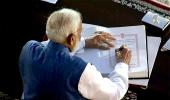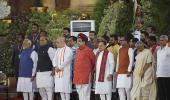'The expeditious enactment of labour codes and strategic measures to bridge the skills jobs gap are critical.'

Although the previous two Narendra Modi governments were also a coalition of sorts since those were technically National Democratic Alliance regimes, the main partner -- the Bharatiya Janata Party -- had a majority.
This is for the first time in 10 years that no single party has got a majority in the Lok Sabha.
This may prompt the government to seek a larger consensus over reforms but they may still carry them forward as was witnessed in introduction of goods and services tax and works of previous governments not having any single party with a majority.
Experts point out that the coalition era with no single party majority can be divided into four distinct periods: 1991-1992 to 1994-1995, 1996-1997 to 1997-1998, 1999-2000 to 2003-2004 and 2004-2005 to 2013-2014.
During each of these periods, significant economic reforms were implemented despite the challenges of multi-party governance (see chart).

A set of India's most significant economic reforms was carried out by a coalition government led by the perceived weak prime minister P V Narasimha Rao.
These reforms unleashed a golden period for the Indian economy, removing decades of controls and licensing restrictions that had characterised the Indian economy.
Those reforms contributed to increasing competitiveness of the economy, bringing in new entrepreneurs, ushering in information technologyand telecom revolutions and a rise of a thriving middle class, now considered the backbone of the Indian economy.
While the single party majority government of Narendra Modi unleashed many reforms including goods and services tax, it could not carry out agricultural reforms through farm sector laws despite the fact that Parliament had passed those pieces of legislation.
It clearly showed that a broad consensus is needed even by the strong governments to bring in reforms.
Pointing out that India has seen minority governments like the Narasimha Rao government, coalition governments and governments with single party majority since 1991-1992, India Ratings Chief Economist Devendra Pant says: "Broadly, no major reforms taken by the previous government have been reversed by successive governments. We have seen a continuity of reforms."
"If any alliance has a majority, then it should not be difficult to push through key reforms."
Achala Jethmalani, economist at RBL Bank, feels a narrow margin of victory for the BJP on its own could lead to faster required reforms which will further support India's growth story.
However, the government this time around would need some sort of common minimum programme to address concerns of alliance partners.
Madan Sabnavis, chief economist at Bank of Baroda, believes there will be a common minimum programme whenever there is a coalition.
"Major issues to discuss would relate to land, labour and agriculture. Otherwise there should be no major concern. Even these issues have been pending for long and hence are not really new," he points out.
Some feel that factor market reforms such as labour codes and privatisation would be difficult to implement now.
For instance, Madhavi Arora, lead economist at Emkay Global, says that factor market reform and privatisation are off the table.
"Factor market reforms like those related to land, agriculture, and labour are now off the table, in our view. Privatisation and asset monetisation are also at risk, which could drag government capex in the short term," she says.

However, Kartik Narayan, CEO staffing at TeamLease Services, anticipates a decisive commitment by the government to formalising India's vast informal workforce.
"The expeditious enactment of labour codes and strategic measures to bridge the skills jobs gap are critical," he says.
As far as infrastructure, one of the main focus areas of the Modi governments in both the stints, is concerned, experts feel that the NDA government will choose projects carefully.
Jyoti Prakash Gadia, managing director at Resurgent India, says he expects that infrastructure development may emerge as a consensus strategy in the long run.
"This is plausible since expansion of infrastructure projects in most sectors does not need any legislative measures," Gadia says.
Some of the key Bills the new government will need to bring in are on Data Protection and The Electricity (Amendment).
The former does not need any consultation with the state governments but the latter has got stymied on this score.
State regulatory commissions, often with political appointees at the helm, have made their displeasure known to the Centre.
So reforms in the distribution segment of the power sector will have to wait for some time.
But before all that happens, the new government will have to take a call on plans for changes in the structure of the bureaucracy.
Reforms in this vital cog of administration may require a deft handling.
Besides, reforms in socio-political areas such as the uniform civil code, and simultaneous Lok Sabha and Assembly elections may face stiff opposition.
With inputs from Subhayan Chakraborty
Feature Presentation: Aslam Hunani/Rediff.com












 © 2025
© 2025